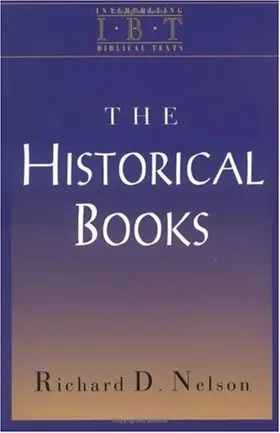

The Historical Books
in Interpreting Biblical Texts
Pages
190 pages
Publisher
Abingdon Press
Published
1998
ISBN-13
9780687008438
Reviews
Nashville: Abingdon Press, 1998. Pp. 190, Paperback, No Price Available, ISBN 0687008433. Bob Becking Utrecht University Utrecht, Netherlands For the new series Interpreting Biblical Texts, Richard Nelson has written an informative and informed volume on that part of the Hebrew Bible that can be depicted as the Historical Books. The series is set up form the point of view of a modest form of reader-response criticism: Meaning is seen as emerging in the interaction between text and reader. In the introduction the general editors formulate as goal not to say much about the world behind the texts but on the worlds created by the texts in their engagement with readers. The author of this volume shares this position, although one gets the impression that he also wants to discuss the worlds in which the texts were created. In the opening chapter (pp.17-29) Nelson discusses the ideas "historical books" and "historiography." He categorizes Joshua, Judges, Samuel, Kings, Chronicles and Ezra-Nehemiah as historical books since they are narrating and organizing Israel's past. In defining historiography he points to three important features Although he does not mention Danto's theoretical statements on historical method, he takes over from him the idea that history is (1) a selection and (2) an organization of the past. To that he adds that (3) historiography has a drive to establish patterns of causation. When it comes to the Biblical books, he remarks (1) that Israelite historiography had been a corporate enterprise, (2) that evidence for the evaluation or the weighing of the sources is absent and (3) Old Testament history writing is centered on God and on God's will. On the majority of these views I agree with Nelson, except the last one. My reading of the Book of Kings has brought me to the conviction that its writers see history steered by a synergism of human and divine forces reacting to each other. In the second Chapter (pp.30-44), Nelson outlines the historical context of the Biblical books under discussion.
[Full Review]
